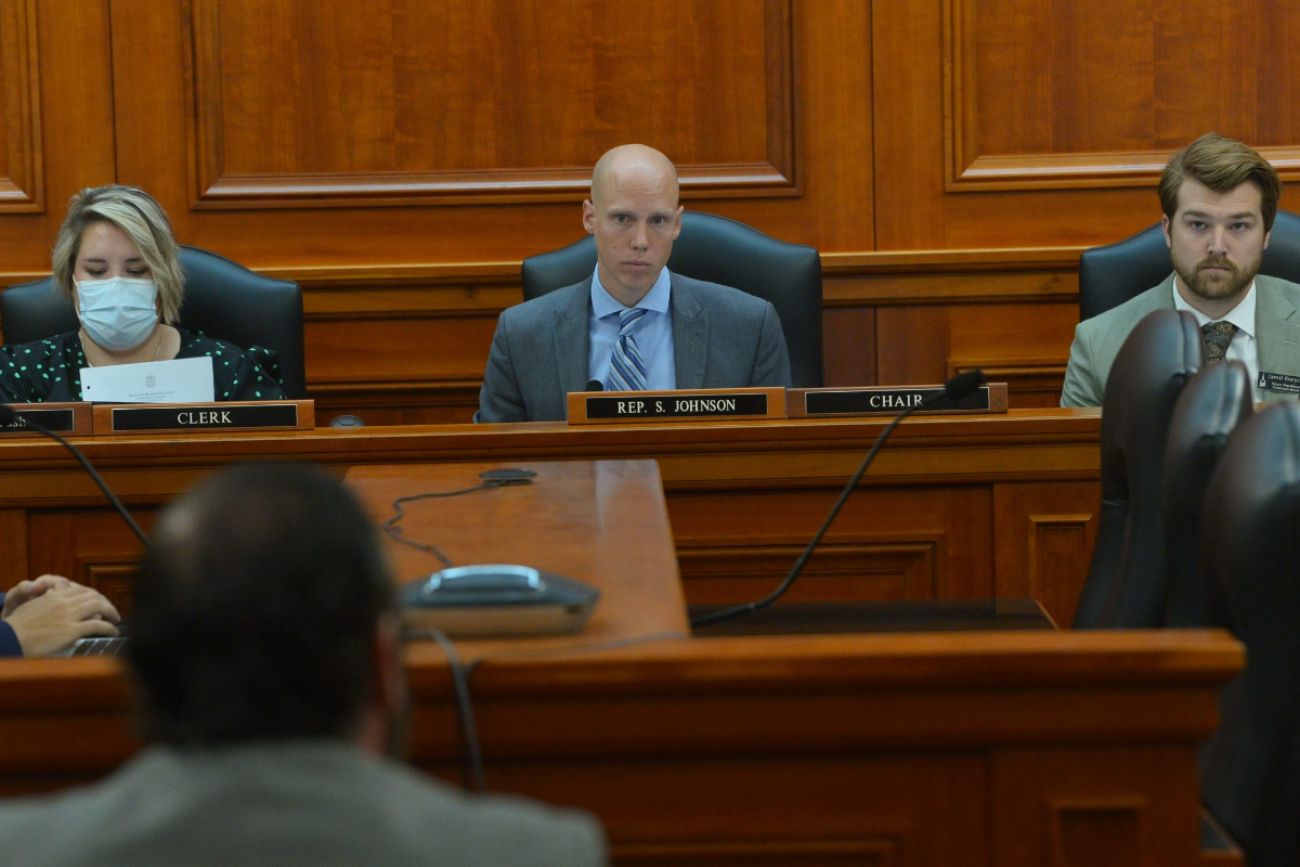Michigan unemployment system still needs fixing, critics tell lawmakers


Sept. 28: Michigan Republicans propose ‘fix’ for state unemployment agency
Sept. 9: Michigan unemployment director, under fire, pledges ‘user friendly’ upgrades
Aug. 26: GOP House speaker calls for removal of state unemployment agency chief
Aug. 25: 500,000-plus jobless Michigan workers brace to lose unemployment benefits
Frustration over Michigan’s unemployment system reignited in Lansing Tuesday as the House Oversight Committee took testimony on the state’s attempt to reevaluate nearly 700,000 jobless claims this summer.
Tony Paris, an attorney who’s worked with at least hundreds of clients who’ve struggled with Michigan’s unemployment office during the past decade, said the letters that went out to 692,000 people in June from the state Unemployment Insurance Agency asking people to recertify claims were yet another sign that the system is broken.
One portion of the June notice said that people receiving the letter faced paying back benefits. But the rest of it was unclear to many people receiving it — and to the people they went to for help.
Related:
- Michigan changed unemployment rules. Now 648,000 may have to repay benefits
- Michigan: Flagged unemployment recipients won’t have to repay money
- Michigan unemployment benefits secure for those who ‘followed the rules’
“I could barely decipher the letter,” Paris told the committee, going on to describe the fear and confusion it generated among jobless residents who’d already received the payments to replace lost income during the pandemic.
State Rep. Steve Johnson, R-Wayland and the committee chair, said he called the hearing because of the waves of complaints and frustration that overtook legislative and legal aid offices as they were contacted following the June notices.
A month later, the state said about half of the people who’d received the letters were notified that they didn’t have to return the benefits. However, another 241,000 were still being evaluated. The agency did not respond to a Bridge Michigan request on Tuesday for updated numbers of how many evaluations remain in progress.
In the meantime, many unanswered questions about that process remain, Johnson said. He said he is asking agency officials, including Lisa Estlund Olsen, acting director of the department, to testify at future hearings.
“I believe there needs to be leadership changes going on there,” Johnson said of UIA at the close of the hearing.
That doesn’t necessarily mean Estlund Olsen, Johnson told Bridge Michigan later Tuesday.
However, the way the letters were handled in June showed “a pattern of incompetence and mismanagement” at the unemployment agency,” Johnson said, including with staff training and fraud investigations.
“We’re hoping to figure out where the problem is there.”
The state has received 3.38 million claims for unemployment benefits since spring 2020 when the COVID pandemic first slammed Michigan, pushing the system to the brink. Complaints about the state’s unemployment system escalated over the past 16 months as widespread fraud, hundreds of thousands of delayed payments and difficulty resolving issues persisted.
It’s a long- troubled system, as Paris noted in his testimony that outlined the recent history of the department. The UIA’s computer, said Paris, attorney with the Sugar Law Center for Economic and Social Justice, was designed to deny unemployment benefits, something that became apparent by 2017 during a federal court’s ruling against the state after bogus fraud charges were filed against thousands of workers.
And that system was just as tough on applicants during the pandemic, Paris said, as they had to navigate online screens that were not intuitive or make repeated attempts to find someone available to answer questions by phone or resolve problems.
Former UIA Director Steve Gray, a reformer hired to fix the system before the pandemic, resigned in November as complaints mounted.
The agency had resolved all but about 20,000 pending claims by the time it sent the letters in June to recipients of Pandemic Unemployment Assistance funds, warning that they needed to recertify their claims or potentially face repayment of benefits received.
The PUA payments were made possible by the federal CARES Act so that jobless workers who didn’t qualify for regular state unemployment, such as part-time, self-employed or so-called “gig” workers, could receive benefits. About 1.9 million of the state’s claims were through PUA.
The state said in the June letters it had been notified five months earlier by the federal Department of Labor that one-fifth of the state’s unemployment recipients may not have been eligible for their payments because they didn’t meet criteria acceptable to the federal department.
Eleven criteria were on the federal agency's list in 2020, then it added three more in February 2021.
But when the PUA program was launched in Michigan, it included “four reasons that were not provided or approved by the (Department of Labor),” according to the state’s letter.
Affected people were told they had to go back to their claims — whether they were active or closed — to choose from the new criteria stating their reasons for seeking benefits, allowing the state to redetermine their eligibility. The new reasons added to the state’s list of options that replaced the outdated ones were similar, prompting advocates to say the effort was a frustrating and unnecessary exercise in “semantics.”
Johnson said he remains frustrated that it’s unclear why the state changed the PUA criteria at all, and why it was suddenly communicated in June. State officials learned about the required change in February, they’ve said, but it wasn’t mentioned in either a March Oversight Committee hearing or to unemployment advocates who’d been working with the department since the beginning of the year.
“When those letters went out, we were as shocked as anybody to read about them,” said Lisa Ruby, an attorney at the nonprofit Michigan Poverty Law Program, during her testimony.
Ruby testified that she’d originally been told the change was the result of either a state audit or a monitoring report, but she said she has received no documentation about either. Johnson told Bridge that he, too, is seeking the documents from the agency.
What became clear during Thursday’s 90-minute hearing is that people were and remain fearful of having to repay legitimate benefits and frustrated by their inability to contact UIA to ask questions about that issue and others. Once again, jobless residents struggled to get through and get answers, several told legislators.
“We just hear these stories, and it’s unbelievable the treatment these people are going through,” Johnson said during the hearing.
Among the people testifying Thursday was Emily Mitchell of Rochester Hills, who described how she was told that she owed the state $25,751 in overpayments. A second letter indicated she owed $27,000.
The amounts terrified her, she said, because she couldn’t afford either amount and had supplied the state with information to prove that her claim was legitimate. She also couldn’t figure out why the same state agency would contact her — first by phone, then by mail — to warn of repayment, but not be able to consistently say how much they expected her to repay.
That, Mitchell said, was on top of the fact that she’d filed a legitimate claim and stopped receiving benefits when she found a new job.
“I followed all of the rules,” she said.
Business Watch
Covering the intersection of business and policy, and informing Michigan employers and workers on the long road back from coronavirus.
- About Business Watch
- Subscribe
- Share tips and questions with Bridge Business Editor Paula Gardner
Thanks to our Business Watch sponsors.
Support Bridge's nonprofit civic journalism. Donate today.
See what new members are saying about why they donated to Bridge Michigan:
- “In order for this information to be accurate and unbiased it must be underwritten by its readers, not by special interests.” - Larry S.
- “Not many other media sources report on the topics Bridge does.” - Susan B.
- “Your journalism is outstanding and rare these days.” - Mark S.
If you want to ensure the future of nonpartisan, nonprofit Michigan journalism, please become a member today. You, too, will be asked why you donated and maybe we'll feature your quote next time!


